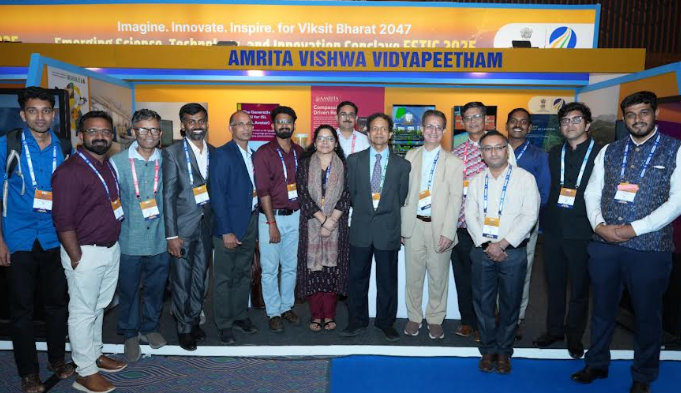13th November, 2025: Amrita Vishwa Vidyapeetham made an impact at the Emerging Science, Technology and Innovation Conclave (ESTIC 2025) at Bharat Mandapam, Pragati Maidan, New Delhi. The conclave, organised by the Department of Science and Technology (DST) under the guidance of the Office of the Principal Scientific Adviser to the Government of India, brought together some of the brightest minds from across the globe.

Event was inaugurated by the Prime Minister of India, Shri Narendra Modi, in the presence of the Nobel Laureate Professor Andre Geim from the University of Manchester. In his address, the PM reiterated India’s commitment towards Viksit Bharat 2047, saying, “The global order is witnessing a major shift. The pace of change today is not linear but exponential. With this mindset, India is advancing in all aspects of emerging science, technology, and innovation with constant focus and commitment. We have established the National Research Foundation to promote research and innovation in our universities. Alongside, we have launched the Research Development and Innovation Scheme with a budget allocation of ₹1 lakh crore.”
During a panel on Artificial Intelligence, Prof. P. Venkat Rangan, Vice Chancellor of Amrita Vishwa Vidyapeetham, highlighted the university’s human-centred approach to AI, stating, “Artificial Intelligence enhances human intelligence and addresses large-scale societal challenges such as healthcare delivery, disaster prediction, education, and sustainable development. At Amrita, we aim to make sure that AI research not only advances technology but also improves humanity through ethical and compassionate application.”
Supporting this sentiment, Dr. Sasangan Ramanathan, Dean Academics and Dean – Faculty of Engineering, added, “Government’s launch of the Research, Development, Innovation scheme fund is a welcome encouragement towards Indian companies investing in R&D, thereby promoting product development in India.”
Meanwhile, Dr. P. Rammanohar, Research Director at the Amrita Centre for Advanced Research in Ayurveda (ACARA), spoke on integrating traditional wisdom with modern science, noting, “Amrita’s approach connects traditional knowledge systems with modern science. At ESTIC 2025, our research showed how evidence-based Ayurveda and modern technology can come together to create innovative healthcare models for preventive and personalised medicine.”
Among the standout innovations featured was Amrita’s Landslide Early Warning System (LEWS) an IoT-based solution developed by the university’s Centre for Wireless Networks and Applications. The system uses real-time data analytics and wireless sensors to detect early signs of landslides and alert authorities, helping save lives in vulnerable regions.
Initially deployed in Munnar, Kerala, where it accurately predicted landslides in 2020, LEWS has since been expanded to Chandmari, Sikkim, covering 150 acres with over 200 sensors adapted for Himalayan conditions. It is now being extended to Odisha’s Gajapati district. By continuously monitoring rainfall, soil moisture, and ground movement, the system enhances climate resilience and disaster preparedness a shining example of technology serving humanity.
Through innovations and collaborations, Amrita Vishwa Vidyapeetham continues to contribute India’s science and technology landscape, aligning with the nation’s vision of becoming a global innovation leader.
